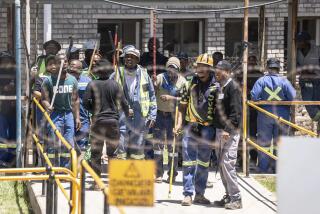300,000 Idle Soviet Miners Uniting to Press Demands : Coal strike: Union leaders from around the nation hammer out a single list of goals.
- Share via
MOSCOW — With 300,000 coal miners now on strike across the Soviet Union, leaders of the 20-day-old protest declared their intention Tuesday of turning the work stoppage into a coordinated national movement to force the Kremlin to grant their demands.
More than 160 mines from the western Ukraine to the Pacific Ocean have stopped working to demonstrate against the government’s failure to keep promises that it made to persuade miners to end a major strike in July, 1989.
“The leaders of the country, busy with their political infighting, have forgotten about the workers,” Alexander Sergeyev, deputy chairman of the Independent Miners’ Union, told a Moscow news conference. “We will try to show that the workers of this country are not cowed, but are still capable of fighting for their rights.”
Since March 1, miners from most of the major coal mining regions have joined the strike piecemeal, with each mine selecting its own list of demands. But for the first time, miners’ leaders hammered out a single list of demands and announced in Moscow on Tuesday that they have formed a committee to push for obtaining them.
At the top of their list was a call for the resignation of Soviet President Mikhail S. Gorbachev, who they say has lost the people’s trust.
Gorbachev, who has refused to meet with the miners, did receive on Tuesday a delegation of lawmakers from Kemerovo, in the western Siberian coal region of the Kuznetsk Basin. He told them he will not comply with the miners’ demands.
Vadim V. Bakatin, a Gorbachev adviser who also attended, criticized the mine workers for trying to dictate terms to the president.
“He rejected all the political demands,” Bakatin said in an interview broadcast on state television.
The miners’ political demands also include the dissolution of the Congress of People’s Deputies, or national Parliament, and the firing of the rest of the national government for its failure to introduce concrete measures to help the country out of its crisis.
They propose the transfer of supreme power in the country to the Federation Council, which is made up of the leaders of each of the 15 constituent republics, and includes Gorbachev’s nemesis, Russian President Boris N. Yeltsin.
Bakatin accused the miners of “introducing chaos” and trying to “paralyze the entire economy” at a time when the country is swamped with other problems.
The miners appear undaunted by the Soviet leadership’s resistance to their demands. The count of mines where workers have put down their tools has increased dramatically over the last 10 days as the strike gained momentum.
“Now 280,000 to 300,000 are participating in the strike,” said Pavel A. Shushpanov, chairman of the Independent Miners’ Union. “We have no alternative.”
Some miners, however, are frustrated that Gorbachev and Prime Minister Valentin S. Pavlov have refused to negotiate with their leaders.
“The central government is paying absolutely no attention to us,” said Anatoly I. Snegurets, a member of the strike committee from the Rostov-on-Don region of southern Russia. “Pavlov wants to use an iron hand to get us back to the mines. But it won’t work.”
The government reaction to this strike differs greatly from its response when hundreds of thousands of miners across the country stopped working in 1989, during the Soviet government’s first major labor crisis in several decades. Then the Kremlin agreed to most of the miners’ demands after less than two weeks.
Snegurets complained that this time, the central government is playing dirty by knocking out telephone and telegraph lines that connect mining regions with the rest of the country. Many miners have complained that local government and enterprise officials have threatened them with heavy fines, lawsuits and other sanctions.
More to Read
Sign up for Essential California
The most important California stories and recommendations in your inbox every morning.
You may occasionally receive promotional content from the Los Angeles Times.













